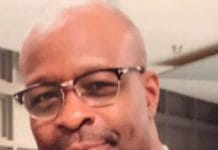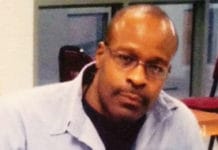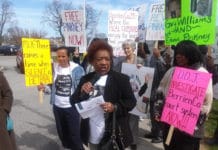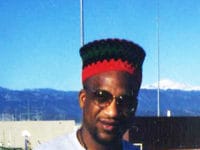On Dec. 14, civil rights leader and political prisoner Rev. Edward Pinkney will have spent a year in Michigan state prison. An all-white jury convicted him of five felony counts of forgery for changing dates next to signatures on a petition drive for a recall election, though no evidence of guilt was presented.

The trial was distinguished mainly by its outrageous violations of due process and constitutional rights. Judge Sterling Schrock sentenced him to 30 months to 10 years and denied bond pending appeal, despite Pinkney posing no flight risk and despite the near certainty that his conviction will be overturned on appeal.
While Pinkney’s appeal proceeds slowly through the grinding gears of the judicial system, he remains in the clutches of the state.
Over the past two months, the Michigan Department of Corrections (MDOC) has attempted to intimidate him into silence and to gradually isolate him from family, friends and supporters. This turn of events began shortly after his defense team filed his appeal brief.
The American Civil Liberties Union of Michigan has also filed an amicus brief in support of overturning the conviction. It is probably not a coincidence that Pinkney has recently endured a sudden escalation of harassment and mistreatment, now that the likely success of his appeal is apparent.
The details of Pinkney’s case give us some insight into the methods by which correctional systems abuse prisoners in general and political prisoners in particular. Indeed, in this era of racist and mass incarceration, all imprisonment is arguably political.
Prisoners who engage in outspoken activism before or during incarceration are among those singled out for especially abusive treatment.
On Dec. 14, civil rights leader and political prisoner Rev. Edward Pinkney will have spent a year in Michigan state prison. The trial was distinguished mainly by its outrageous violations of due process and constitutional rights.
This high-profile case also demonstrates how MDOC responds to demands for truth and accountability from Pinkney supporters: typically through stone-walling and stubbornly relying on an assumption of a gullible public. While lying to the public may be the modus operandi for bureaucrats speaking on everything from climate change to police brutality, corrections officials seem especially prone to this strategy.
By isolating prisoners and inhibiting their communication with supporters, prison officials can easily manipulate situations to avoid scrutiny and deny culpability. One MDOC official, without speaking with Pinkney, claimed to know “the facts” of the situation because she had reports in front of her – written, of course, by her colleagues in the correctional system.
Pinkney himself wrote from prison:
“I have been an eye-witness to at least five incidents where prisoners were beaten by corrections officers. The Michigan Department of Corrections has been able to dismiss the majority of allegations of abuse and misconduct by claiming that inmates lie and the correctional department always tells the truth.
“The privileged public believes that the prison system is doing its best to protect them. In the eyes of the public, law enforcement and corrections do not lie.”
* * *
By isolating prisoners and inhibiting their communication with supporters, prison officials can easily manipulate situations to avoid scrutiny and deny culpability.
In 2013, Pinkney and fellow community organizers began a petition seeking to recall Mayor James Hightower of Benton Harbor, Michigan, who opposed an income tax that would have raised revenue from corporations for the extremely financially distressed city. In 2010, Benton Harbor became the first city in Michigan to undergo the dictatorial rule of an Emergency Financial Manager, appointed by former Democratic governor Jennifer Granholm.
Over 90 percent of Benton Harbor’s residents are Black and nearly 50 percent live in poverty (U.S. Census Bureau). Appliance giant Whirlpool Corp. is headquartered in Benton Harbor and announced record-breaking third quarter sales.
At trial in November 2014, Berrien County Prosecutor Mike Sepic failed to present any direct evidence that a crime was committed, much less that Pinkney committed a crime. Only the defense summoned testimony that a crime was committed: Three witnesses testified that they saw someone else, not Pinkney, change the dates without Pinkney’s knowledge.

Indeed, Sepic failed to come up with even circumstantial evidence of Pinkney’s guilt. Instead, Judge Sterling Schrock permitted Sepic to question Pinkney and other witnesses about their constitutionally-protected political and community organizing activities, supposedly to point towards a motive for changing the dates. It is important to note that the petition drive had sufficient signatures without the five in question, but an appellate court cancelled the recall election altogether as a result of the unresolved charges against Pinkney.
There can be no doubt that the prosecution was politically motivated and intended to both derail the recall of the mayor and to intimidate Pinkney, along with all Benton Harbor activists, from engaging in legal political activity. As an attempt at further intimidation, the warrant for Pinkney’s arrest on non-violent charges was delivered to his home by a SWAT team and multiple police cars driving through his neighborhood – even though his attorney had already informed the city that Pinkney would turn himself in if warranted.
There can be no doubt that the prosecution was politically motivated and intended to both derail the recall of the mayor and to intimidate Pinkney, along with all Benton Harbor activists, from engaging in legal political activity.
After an initial few weeks at Marquette Branch Prison in the Upper Peninsula of Michigan, Rev. Pinkney was housed for nearly nine months at Lakeland Correctional Facility in southern Michigan. While there, he was considered a model prisoner and was popular with many other prisoners as a prisoner rights advocate and faith leader.
On Sept. 21, Pinkney’s defense team filed for appeal of the unjust conviction, charging that his constitutional and due process rights had been violated. Two weeks later, a new order of Kafka-esque mistreatment began.
Pinkney was transferred from Lakeland back to Marquette Branch Prison, 480 miles from his home. Marquette is well-known among veterans of the Michigan prison system as a hardship assignment for prisoners due to its dictatorial warden (Robert Napel), cruel guards, cold and unhealthy environmental conditions, and the domination of the prison hierarchy by white supremacist groups. Pinkney is a Black community activist who has led a David and Goliath battle against racism and corruption in the judicial and political systems of Berrien County.
After Pinkney’s transfer, supporters began a call-in campaign from around the state and country to MDOC headquarters in Lansing. MDOC officials’ explanations for the transfer shifted over time and strained credulity.
First, they claimed the transfer was because Pinkney belonged in a “safer,” lower-security, Level I facility, and so he was only temporarily housed in Level II at Lakeland. However, there are at least five other Level I facilities in southern Michigan, closer to Pinkney’s wife, attorney and supporters. What’s more, Pinkney waived his right to a Level I facility in writing because he felt much safer at Lakeland.
Pinkney is a Black community activist who has led a David and Goliath battle against racism and corruption in the judicial and political systems of Berrien County.
MDOC next claimed that Pinkney had only been housed at Lakeland for purposes of proximity to his court hearings, but as his writ was now finished, he was returned to Marquette where “they saved a bed for him” (as if he might fear they hadn’t). However, Pinkney had not appeared at a court hearing since April, whereas oral arguments for his appeal may be scheduled as soon as three months from now. Granted, MDOC officials do not legally need a rationale for any prisoner transfer – one more capricious form of prisoner harassment that can also place a great burden on prisoners’ families.
While MDOC officials continued to obfuscate, another source with no reason to lie revealed the actual reason for Pinkney’s transfer to a more remote and more dangerous location. Before the transfer, a sympathetic staff member told Pinkney that he had recently overheard other staff discussing the impending transfer.
Among the phrases overheard were “we don’t have any trouble with him, but they must really hate him.” “We” in this context refers to the local MDOC staff. It cannot be proven exactly to whom “they” refers. However, a likely suspect would be someone who hates Pinkney to such a degree that they are willing to use political influence to exile him to Marquette for special mistreatment.
The chilling implication is that this particular transfer was politically motivated, executed by MDOC officials in Lansing but directed by the powerful political-corporate elite, driven by Whirlpool Corp., who dominate politics in southwestern Michigan. “They” do hate Pinkney with a passion.
Indeed, at a county Republican meeting the county clerk and sheriff received standing ovations when they announced Pinkney’s conviction. This latest conviction is not the first time Pinkney has been framed and railroaded in Berrien County.
In 2007, an all-white jury convicted him in a second trial – after a mistrial due to a hung jury – on charges related to another ballot petition. Sentenced first to house arrest, Pinkney ultimately spent a year in prison on a parole violation charge for quoting the Bible before the ludicrous charge was overturned on appeal.
The chilling implication is that this particular transfer was politically motivated, executed by MDOC officials in Lansing but directed by the powerful political-corporate elite, driven by Whirlpool Corp., who dominate politics in southwestern Michigan. “They” do hate Pinkney with a passion.
It requires little imagination to picture someone in Berrien County making a back door contact with the Republican state administration and arranging for Pinkney’s expedited punitive transfer to a distant prison before his appeal succeeds. However, to hear MDOC officials talk, one would think no official has ever done anything untoward in the history of Michigan corrections.
On the way to Marquette, Pinkney was held in shackles that abraded his ankles until they bled. MDOC officials claim his medical record indicates no abrasions.
On arrival at Marquette, he was housed in a cell so moldy he experienced dizziness, difficulty breathing and nausea. The mold may have been toxic black mold which can cause severe, sometimes permanent health problems. While MDOC officials continue to minimize the mold issue, supporters have heard accounts of other prisoners whose health has been ruined by exposure to black mold at MDOC facilities in northern Michigan.
To be clear, Lakeland was no picnic either, but compared to Marquette, Pinkney had some measure of physical security and freedom. Other Lakeland prisoners made sure to escort him to and from the library where he helped prisoners with legal research.
Soon after arrival at Marquette, prison guards began publicly belittling Pinkney in order to undermine his reputation with other prisoners. A prisoner recommended him to preach at Marquette, and the assignment was revoked at the last minute without explanation.
Guards began ridiculing him and trying to provoke him into reacting, a common strategy to give them an excuse to attack a prisoner. One guard loaned him a rule book, and then another guard accused him of stealing it.
Pinkney suspects that those who hate him have placed a hit on him within the prison system and that his life is in danger.
Soon after arrival at Marquette, prison guards began publicly belittling Pinkney in order to undermine his reputation with other prisoners.
After the transfer, Pinkney remained in daily communication with his wife and reported that the public support helped pressure officials to move him out of the moldy sleeping quarters. However, on Oct. 23 Pinkney’s phone privileges were abruptly cut without due process.
He was accused of making three-way phone calls, which are a technical impossibility from prison phones, and of soliciting funds for a “business enterprise.” This appears to be yet another politically motivated frame up, since what Pinkney had actually been discussing shortly before phone privileges were revoked was the idea of a public protest outside MDOC headquarters.
Pinkney and his supporters are within their constitutional rights to plan a public protest against the agency (which happened in Lansing on Nov. 2). Prisoners also have the right to solicit funds for their own legal defense and for items for their well-being, such as food and phone calls. Pinkney continues to fight these charges while his phone use is suspended until July 2016.
On Oct. 27, Pinkney celebrated his 67th birthday in prison, cut off from communication with family and friends except for postal mail. He was prohibited from using the prison email system until Nov. 26 as part of his “punishment.”
Pinkney continues to fight these charges while his phone use is suspended until July 2016.
For a period of time, he was confined to his cell at all times, except for meals and visitors. He alleges that even mail from his attorney was tampered with, a serious violation of attorney-client privilege. The ACLU of Michigan put MDOC on alert with a letter dated Nov. 5.
This steady shrinking of Pinkney’s rights and liberties culminated in solitary confinement in Level V (maximum security) on Nov. 20. Even in MDOC’s biased administrative hearing system, in which prisoners fight allegations by prison staff without recourse to legal representation or other resources, the charges against Pinkney were soon thrown out.
On Nov. 25, MDOC transferred him back to Level I, to the same sleeping quarters with black mold that impaired his health when he first arrived. He now has diagnosed high blood pressure, which he did not have before his transfer to Marquette. MDOC medical staff check his blood pressure once weekly.
What were these charges, allegedly so serious that Pinkney had to be segregated from the prison population in maximum security and isolated from all visitors? A supporter, David Sole, visited him on the evening of the 20th and took notes in order to remember details about steps for publicizing Pinkney’s case and building public support.
A guard kept close watch on the conversation; other prisoners and visitors were not so closely monitored. As he was exiting the prison, a guard confiscated Sole’s notes. Pinkney was arrested and segregated in solitary confinement.
When Sole attempted to visit the next evening, he was confronted in the parking lot by an Officer Johnson and informed that Pinkney could receive no visitors due to allegedly attempting to “smuggle information to his wife.” When Sole pointed out that it was he who had written the notes and pocketed them, not Pinkney, Johnson shouted at him to leave prison property immediately. Johnson refused to disclose his badge number.

On his release, Pinkney called the punishment “a power move” by MDOC. Perhaps it was in retribution for the press conference Sole organized with local media earlier on the 20th, including an interview that aired on TV news. MDOC officials claimed to the media that Pinkney had filed no grievances and was subject to the same rules and treatment as other prisoners.
In actuality, Pinkney filed a Step I grievance protesting the suspension of his phone privileges and when that grievance was denied, MDOC disallowed him from filing a Step II grievance. Pinkney calls the grievance process “a joke.”
Some of Pinkney’s treatment by MDOC falls within the picture of the arbitrary and casual cruelty inflicted on all prisoners. Pinkney himself stresses this point.
In the early 1990s, he led a campaign against mistreatment of Black inmates in the city jail in Kalamazoo, Michigan. In 1999, he served several months in prison for a flimsy embezzlement conviction involving less than $150; Pinkney claimed innocence but was manipulated by his attorney into pleading guilty.
In prison, he underwent a spiritual experience and emerged an aspiring pastor and an even more dedicated activist for racial and social justice in his home community of Benton Harbor. He organized his community to target racism and oppression in police, judicial, economic and political systems.
For over a decade, he served as court watcher nearly every day Berrien County court was in session, witnessing and documenting injustice and leading a weekly march on the courthouse.
Some of Pinkney’s treatment by MDOC falls within the picture of the arbitrary and casual cruelty inflicted on all prisoners. Pinkney himself stresses this point.
Even from prison, he helps fellow prisoners with legal research, helps them voice their causes through BANCO’s blog, and organizes for prisoners’ basic rights and dignity. He frequently reminds his supporters: “We have to keep fighting, because this is bigger than me. This is about what they can do to all prisoners.”
In this era of mass incarceration, when the United States houses white prisoners at rates two to six times the total rates in Western European countries, and six times as many Black prisoners as whites, all prisons, all imprisonment, and all prisoners are political. Prison serves multiple roles in this politico-economy, including low- or no-cost labor, diversion of masses of unemployed people, pork-barrel employment projects for white rural communities where many prisons are housed, profit for privately-owned prison service industries, and, last but not least, intimidation and social control through fear, violence and repression.
Those imprisoned for their political activity are victims of counter-insurgency strategies specifically intended to crush organized efforts to fight back against the political, economic, social, law enforcement and judicial systems that already trap so many Black, Brown and poor people. In the U.S., the dominant narrative claims that there are no political prisoners here – that they only exist in countries like China, countries which should be sternly reprimanded for their human rights violations.
Those imprisoned for their political activity are victims of counter-insurgency strategies specifically intended to crush organized efforts to fight back against the political, economic, social, law enforcement and judicial systems that already trap so many Black, Brown and poor people.
In reality, the U.S. has many imprisoned for their political activity, most famously Mumia Abu-Jamal and Leonard Peltier, both people of color, both framed for murder, both decades into life sentences, and both suffering health problems.
Rev. Pinkney stands as the most glaring example of imprisonment for political activity in Michigan and possibly in the Midwest. As civil rights attorney Hugh “Buck” Davis put it, “Given the thousands of irregularities in election petitions in Michigan every year, it’s clear that this is political prosecution in retaliation for successful community and electoral organizing. Two and a half to 10 years? He’s a political prisoner.”
With a false conviction and denial of bond pending appeal, his legal case represents a miscarriage of justice. The harassment and abuse he continues to suffer in MDOC custody reflects the kind of torture to which many prisoners are routinely subjected in the U.S.
And the indomitable Pinkney’s latest message? “I am doing great. WE ARE WINNING THIS BATTLE.”
Geraldine Matthews is an activist in Michigan. She can be reached via gormatthews@gmail.com. This story first appeared in Counterpunch, at http://www.counterpunch.org/2015/12/11/the-routine-lies-of-prison-officials/.

 Store
Store











